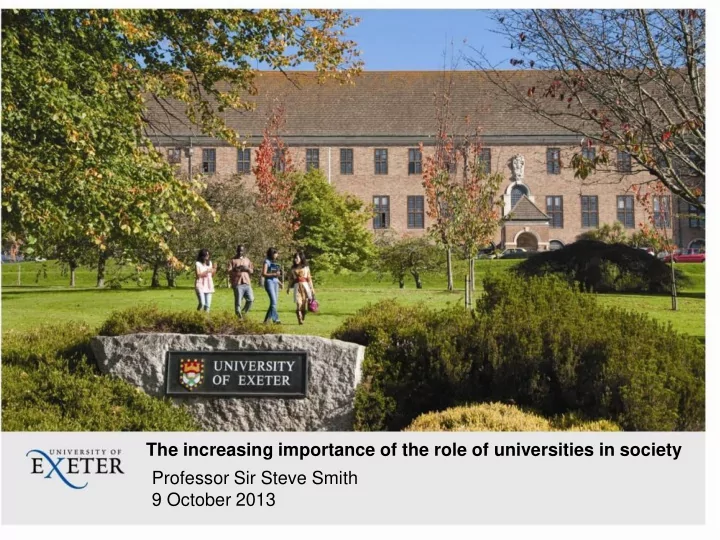

The increasing importance of the role of universities in society Professor Sir Steve Smith 9 October 2013
Summary Talk to cover three themes: 1. How universities contribute to economic prosperity 2. Government investment in HE and the impact agenda 3. Global research concentration and international collaboration
Universities as contributors to national prosperity • Winning the global race for jobs and wealth – the role of universities • By 2020, 82% of new jobs in the UK will require a degree • Top 10 ‘in demand’ jobs in 2010 were in industries that did not exist in 2004 • Two thirds of growth between 2000 and 2007 came from knowledge intensive sectors of the economy (and 2% of job losses) • Universities are a crucial partner in economic growth
Universities as contributors to national prosperity • The UK has a leading HE system – 7 th largest export industry worth £10.2bn per year • UK universities on track to generate £17bn annual export earnings by 2025 • Lord Sainsbury’s Review, The Race to the Top (2007) is the best available analysis of how science and research policy relate to economic growth
Universities as contributors to national prosperity • Logic of Sainsbury’s argument is to fund research selectively • In the UK, out of 110 universities: - c.80% research funding focussed on 25 institutions - concentration of PhD training in Doctoral Training Centres • Debate about the ‘right’ distribution of research resources • Leading universities must compete in a global market
Global Investment in Higher Education • Economic recovery has begun, but it will take time • Massive growth in Indian and Chinese economies • Total investment in higher education as proportion of GDP: • UK (1.4%) • US (2.8%) • Japan (1.5%) • OECD average(1.6%) • UK public investment in HE is only 0.7% of GDP
Research and demonstrating impact • Research Excellence Framework and the impact agenda • Impact worth 1/5 of grading in new research assessment rules • New knowledge and innovation has generated at least two-thirds of productivity growth in the UK over the past 10 years • Public engagement agent Exeter Catalyst Project
Global research performance • Universitas 21 rankings: UK is 24 th on resource inputs and 2 nd on outputs • Japan is 25 th on inputs and 14 th on outputs • Japan – fourth most successful education superpower ( Learning Curve ) • Research concentration
Global research concentration • Concentration is a global trend: - Japan : ‘Leading PhD Initiative’ - US : doctoral degrees offered by only 614 (out of 7018) universities - China : pursuing world-class status for a maximum of 39 and a minimum of 9 universities (C9) out of 2300 institutions (Project 985) - Germany : £2bn to create 37 clusters of research excellence and 9 world-class universities - France: 33 (out of c.160) universities, got 2/3 of the resource in 2010 - South Korea : Brain 21 Programme
International Research Collaboration • ‘ The Fourth Age of Research’ ( Jonathan Adams , Nature) • Most highly cited work is international (50% increase with papers with authors in more than one country) • In 2011: 48% of UK papers had no overseas author (down from 85% in the 1980s) • US: 67% of research is still domestic (1981: 94%) • China: 75% of research is produced in-country • Growing divide between international and domestic focussed institutions
International Research Collaboration • UK & US: international collaboration = adds 20% to average citations • UK: 2001 publications: 1.21 world average levels of citation 2011 publications: 1.47 world average levels of citation • Papers with at least one international co-author: rose from 1.48 to 1.72 world average citations (2001-2011) • 65 UK HEIs with 40% international co-authored papers: 1.1 world average citations; 10% of research funding; 5% research grants; 1% of research council studentships
Concluding Remarks • How do we win the global race? 1. Need public investment in higher education 2. Concentration of research funding 3. Promote international collaboration 4. Invest sufficiently in R&D 5. Embrace the marketisation and internationalisation of HE
Thank you for listening Questions and Answers Contact us: Dr Victoria Alcock Executive Officer to the Vice-Chancellor, v.j.alcock@exeter.ac.uk
Recommend
More recommend